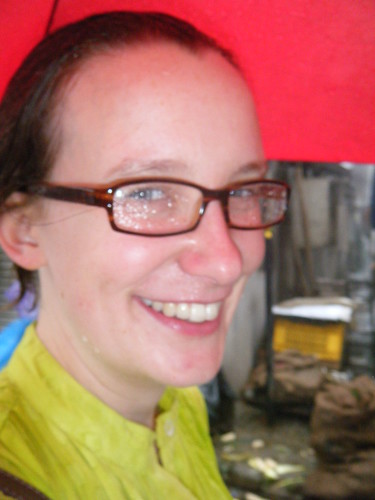This is post 3 of 5 of the Open Data India series, following Lucy and Laura’s visit to learn about the challenges and opportunities for open data. Read previous posts from Bangalore and Chennai on the main blog.

After joining forces with the DataMeet group in Bangalore and Transparent Chennai’s open data workshop, we were prepared for the challenge of ‘going it alone’ when we decided to arrange an open data meet-up in Mumbai.

Seriously soggy!
Thanks to @prolificd and @Netra, we had an excellent venue for the Mumbai meet-up. The Pinstorm offices have hosted Wikimedia gatherings in the past, and are a great space for fresh thinking and debate. The real challenge proved to be getting around Mumbai itself. As we soon grasped, Mumbai is an enormous city, and suffers from heavy traffic and – as we witnessed! – torrential monsoon rains. Probably for a combination of these reasons, our Mumbai meet-up drew the smallest crowd of the trip and was a very cosy affair.
The Discussion
Despite (or perhaps because of!) the select group, the evening was productive. Conversation was wide-ranging, and included:
YourTopia India

The original YourTopia calculates which European country best aligns with your values, by allowing you to weight the relative importance of different indicators. An Italian version – YourTopia Italy – has since been created, which compares regions of Italy. Pranav Sidhwani is now working to produce something similar for the different states of India.
Pranav pointed out the wider value of YourTopia. Not only is it a valuable tool in and of itself, but it requires several key datasets including e.g. health, education and employment data to be collected. The act of gathering these data sets is a major first step for open data in India. All data gathered will be stored on the Datahub.
- To get involved with the YourTopia India project, sign up to the YourTopia list.
Licensing
As in Bangalore, the group identified a real problem with a lack of explicit licensing. If material isn’t licensed – whether openly or otherwise – there is serious ambiguity over how it can be used.
In Mumbai, we were offered an interesting perspective on the origins of this issue. It was suggested that culturally, copyright has a different history in India [1]. Arguably, the ongoing legacy of this is that people are less likely to consider issues of licensing when publishing or re-using data. Anecdotally, it has been organisations such as Wikimedia who have objected to the re-use of unlicensed material in India.
Whatever the history, it remains clear that encouraging people to apply a license – any license – is one of the key changes that will allow re-users to work appropriately and confidently with data.
Understanding Data
As in Bangalore, the group affirmed that many people struggled to interpret basic visualisations such as bar charts and line graphs. However, it was drawn to our attention that under the IT@School initiative, Kerala has seen the world’s largest simultaneous deployment of FOSS based ICT education. I hadn’t come across this project before, and am interested to explore further how early exposure to FOSS software and familiarity with ICT will impact upon this generation.
Other topics of conversation at the meet-up included the potential and challenges of open data for cultural heritage, GLAM, science, agriculture, and even for understanding the impact of planetary motion on agricultural outputs. There was much to discuss!

Useful Links
As always, we were introduced to several interesting databases, projects and websites at the meet-up. Here are just a few of the initiatives which were discussed.
- Visualdata.in – @prolificd’s project, which builds visualisations based on publicly available data sets.
- MOPSI – Ministry of Statistics and Programme Implementation – a useful site home to a significant amount of data, although in my recent exploration, I struggled to find any information on licensing.
- Parliamentary Legislative Research – presents analyses of data related to parliament; allows you to track bills, to view key statistics on parliament, to track the attendance of your MP etc. Deploys a non-commercial license; I struggled to find raw data on the site.
Wishlist
Much as in Bangalore, the wishlist included:
- More data, and better availability of data that has already been collected
- More data in a machine-readable format
- Better tools for people who want to work with data
- More uniformity around the data – what is collected, where it is gathered
All in all it was a great evening. Although the group was small, it was wonderful to meet excellent OKFN volunteers such as Pranav in person, to link up with the Wikimedia community, and to chat to others with a potential interest in open data. To keep this discussion going, please sign up to the India mailing list.
[1] For a brief overview of the history of copyright in India, see http://archive.icommons.org/articles/a-very-brief-history-of-copyright-development-in-india.
